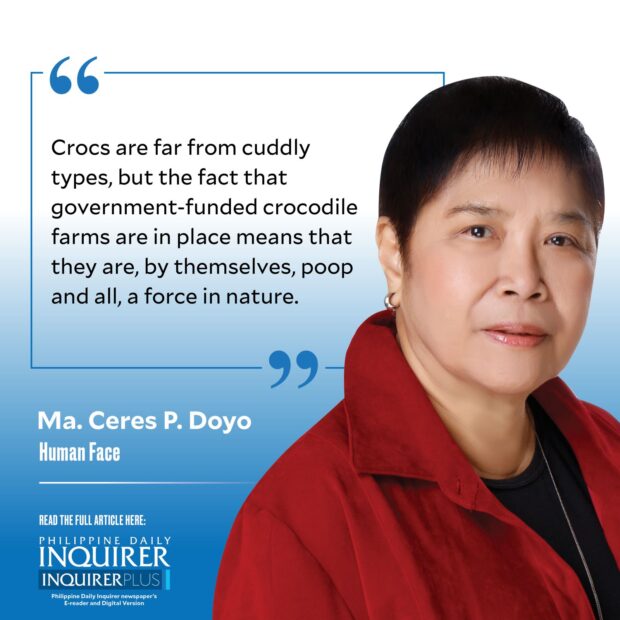In defense of crocodiles
Days before the State of the Nation Address was to be delivered in Congress by the head of state last Monday, I already noticed Facebook posts with photos/illustrations relating to crocodiles.
Corrupt politicians were being compared to the endangered carnivorous reptiles that inhabit bodies of water or are being raised in captivity so the species does not go extinct.
Article continues after this advertisementHere they go again, I thought. But instead of making comments on other people’s posts and getting bashed, I posted one myself.
I wrote: “As nature lovers, we should not demonize crocodiles by attributing to them the worst in humans. Crocs are part of the web of life.” That was the gentlest way I could say it. I could have added, they have a right to be here, as the “Desiderata” reminds.
I did not get bashed, instead FB netizens agreed. One comment in Filipino said: “Crocodiles, when they’ve eaten enough, stop,” but not the rapacious elected human beings whose greed is bottomless or “unli.” A friend commented that when humans are bad, they are bad; they are not gorillas, crocodiles, snakes, etc. I liked the comment of environment advocate Delfin Ganapin: “Do you know that even crocodile ‘poop’ is critical to a healthy river or lake ecosystem?” This I did not know and I should like to know how.
Article continues after this advertisementCrocodiles, one of the biggest and heaviest of the reptilian species, longer in length than the venomous komodo dragon of Indonesia (I have seen some), are cousins to the extinct dinosaurs that kids of a certain age are so enamored with. True, crocs are far from cuddly types, but the fact that government-funded crocodile farms are in place means that they are, by themselves, poop and all, a force in nature.
Whenever I have the chance, I bring up speciesism or being speciesist (as in racist, sexist, ageist, etc.) which is the human mindset that tends to look down on nonhuman living species as inferior, and therefore a subject of denigration. Worse would be attributing to them despicable or inferior human traits.
Consider the words lapdog, crocodile tears, loan shark, bird-brained, asshole, etc. Why mock a dog’s loyalty to its human by comparing a sycophant to them? Have you watched a video of a bird in the wild weaving an intricate nest with awesome symmetry and beauty? What have sharks got to do with usurers? The serpent (was it really a snake?) in Eden got a bad press in the Book of Genesis in the Bible. But didn’t Jesus the Messiah ride a humble ass on his way to Jerusalem?
International brands Lacoste and Crocs have a crocodile as their logo or trademark. The green reptile on Lacoste products (shirts, bags) is not an alligator, but a crocodile, the company website says. The company was founded by French tennis star Jean René Lacoste who was known as “the Crocodile” because of his prowess on the tennis court. Those who are splitting hairs over the Department of Tourism’s rebranding efforts that flopped could read up on how the shirt company came up with an unlikely brand logo that succeeded.
Crocs, Inc., an American footwear company, markets foam clogs with a croc on them. Counterfeiters from you-know-where are still having a field day producing look-alikes of the two famous crocodile brands, but product quality always wins over the can-afford loyal customers while the hoi polloi can settle for the “class A” and look as good.
But for the more serious, profound stuff that relates to living creatures on this planet, there is so-called creation spirituality as espoused by Matthew Fox (author of “The Coming of the Cosmic Christ,” etc.). In his book “Creation Spirituality: Liberating Gifts for the Peoples of the Earth,” Fox writes about the interconnectivity in our universe. We human beings are interconnected with all other creatures, crocodiles and eagles among them.
“Today’s science tells many stories about interconnectivity which translate into a moral law for humans. As Thomas Merton teaches: ‘the whole idea of compassion is based on a keen awareness of the interdependence of all these living things, which are all part of one another and all involved in one another.’ Compassion is born of interconnectivity, the cosmic law of responding to another’s pain and suffering, joy and celebration as one’s own.”
—————-
Send feedback to cerespd@gmail.com

















